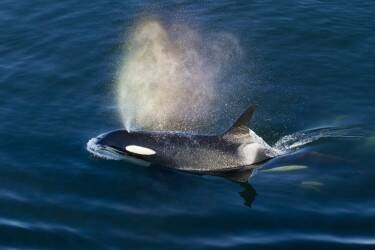Submitted by Wild Fish Conservancy
In a groundbreaking decision, Canadian seafood certifier Ocean Wise announced they can no longer recommend salmon caught in Southeast Alaska fisheries as ‘sustainable’. The delisting responds to concerns over the impact of the region’s fisheries on endangered Southern Resident orcas and at-risk salmon populations from rivers coastwide. Effective immediately, salmon harvested in purse seine, drift gill net, and troll fisheries in Southeast Alaska can no longer bear the Ocean Wise label.
“We commend Ocean Wise for their bold action and leadership. Certifiers have long been aware of the severe impact of Southeast Alaska’s ocean fisheries on our region’s most vulnerable salmon and orca populations,” stated Emma Helverson, Executive Director of Wild Fish Conservancy. “Being the first eco-label to recognize these effects, Ocean Wise is setting a higher standard for seafood certifications based on science and transparency. We strongly encourage U.S. seafood certifiers to follow this lead.”
Ocean Wise’s decision comes in response to objections raised by Canadian conservation organizations over Southeast Alaska fisheries that harvest migrating salmon from rivers in British Columbia, Washington, and Oregon, many of which are from populations in critical condition. Despite well-intended efforts by resource managers and fishers, incidental catch of at-risk populations remains unavoidable in ocean fisheries.
The delisting precedes a July 18 hearing in the U.S. 9th Circuit Court of Appeals of a case brought by Wild Fish Conservancy challenging the operation of Southeast Alaska’s Chinook troll fishery. If successful, the case could result in the closure of the largest Chinook fishery in the world, which scientists predict would be the most significant recovery action for Southern Resident orcas since they were listed in 2005. In May 2023, a U.S. District Court overwhelmingly agreed the fishery plan authorized by the U.S. government seriously violated endangered species and environmental laws and ordered the fishery closure to safeguard threatened Chinook salmon and endangered Southern Resident killer whales.
Despite the fishery occurring in the ocean outside of Southeast Alaska, up to 97% of the Chinook harvested originate from rivers in British Columbia, Washington, and Oregon and many are from populations that are in severe decline and federally protected in the U.S. or Canada. These fish are being caught before they can return back into southern waters where the Southern Resident killer whales encounter them and at levels that are insufficient to support the population’s reproductive growth. Unfortunately, these Chinook continue to be certified by both major U.S. seafood certifiers as ‘sustainable wild-caught Alaskan Chinook.’
“Certifiers are key players in guiding consumers towards environmentally responsible choices. However, if their standards do not align with current scientific knowledge or do not prioritize genuine sustainability, consumers are misled and misinformed,” says Helverson. “If provided with the facts, consumers would avoid purchasing threatened or endangered salmon knowing they are contributing to their decline. It is in no one’s best interest to deplete natural resources to the point where they are no longer sustainable.”
Research published earlier this year concluded that curtailing ocean fisheries in British Columbia and Southeast Alaska is the most important recovery strategy that can be implemented to recover the Southern Residents and the size and abundance of the wild Chinook their survival depends on. Scientists predict the single action of halting the Southeast Alaska troll fishery would likely provide the whales’ access to enough prey to stabilize the critically endangered population and allow for their recovery.
Currently, there are only 73 individuals in the population, an alarming decrease from nearly 100 only 25 years ago. Earlier this month, experts announced a second whale is missing and both are considered likely deceased. Reduced prey availability, specifically large and abundant wild Chinook, has been identified by killer whale experts and NOAA as the primary cause of their decline. Research has shown an alarming 69% of Southern Resident killer whale pregnancies are aborted due to insufficient prey.




